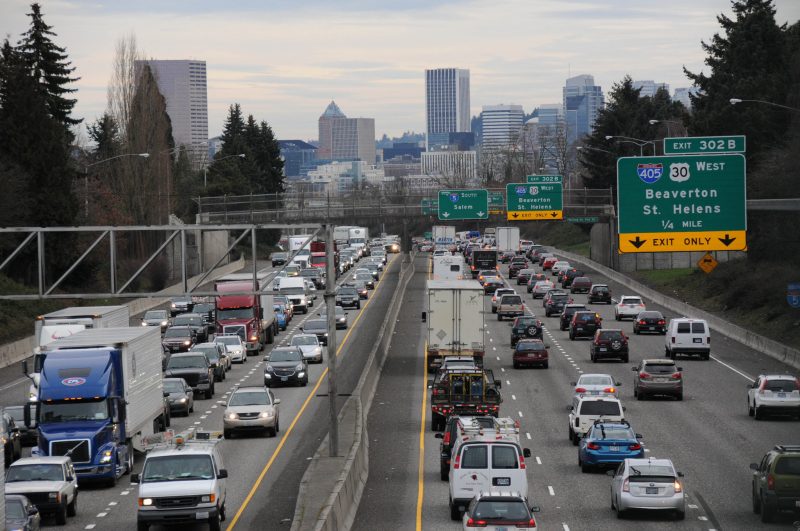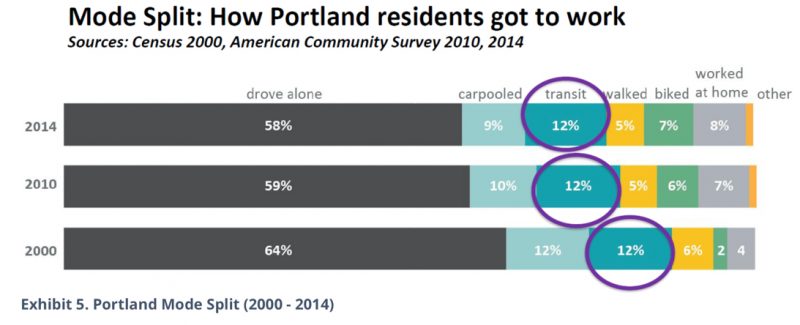This two-part article is by Aaron Brown, founder of No More Freeways PDX and former board president of Oregon Walks.
TriMet has appointed Doug Kelsey as their new General Manager. Neil McFarlane stepped down last month, after serving in the top role for the Portland region’s transit agency for nearly a decade. A few weeks ago, The Oregonian conducted an exit interview with McFarlane. His comments are instructive and they help illuminate the disconnect between our region’s bold aspirations for twenty-first century infrastructure and the governing agencies that appear too hamstrung by ineffective transparency and accountability measures to provide the services our region wants.
His comments about a certain freeway project caught my eye:
Q: Last year, you spoke in support of several highway expansion projects as part of a proposed TriMet ballot measure. Do you think those projects are a good idea in the absence of a transit project, or a political necessity to get the transit project through?
A: I talked about them as a basket, but I do think those are good projects. TriMet has always advanced sort of a multimodal agenda and recognized that we’re part of the solution, not the only solution.
Candidly, I sometimes still don’t get some of the objection to a project like Rose Quarter. [A $450 million proposal would add auxiliary lanes and shoulders to Interstate 5 through the Rose Quarter.] We’re essentially widening a pinch point to be reasonable in terms of the ons and offs, and movements from one freeway to another.
We expect that the top brass at TriMet at least possess passing familiarity with our coalition’s opposition to this mega-project. We’ve rehashed our talking points to anyone who will listen, and will likely do so for years to come until the region’s leaders come to their senses.
Instead, we’ll speak, you know, candidly, about the absurdity of TriMet’s willingness to be an accomplice to this boondoggle, and what it says about the agency’s current priorities and understanding of our region’s forthcoming mobility challenges.
Candidly, the reallocation of billions of taxpayer subsidies into transportation investments that serve our communities better than freeways is nothing short of imperative for the success of our region’s myriad public health, climate, housing, congestion relief and anti-poverty initiatives. Any transportation investment that doesn’t start with the explicit intention to chip away at automobile use as the primary method to access jobs, education, and shopping has significant consequences for a planet with literal melting ice caps, a region with worsening congestion, and a city ostensibly committed to equity. Perpetuating the continued necessity of automobile ownership is especially unhelpful to the growing number of people in our region who are unable to own or operate a car due to age, (dis)ability, citizenship, or cost. With our changing (and aging) demographics, the number of Oregonians in these categories will only increase (to say nothing about waning consumer preference or the rise of autonomous vehicles).
Why does this matter? Well, candidly, TriMet’s general “¯\_(ツ)_/¯” stance about ODOT’s continued push for this outdated infrastructure is all the more baffling because it’s TriMet’s employees, customers, and the agency itself who stand to benefit the most from any removal of this antiquated, vestigial subsidy.
Every dollar our region wrestles away from ODOT’s freeway expansion plans is a dollar we can spend on infrastructure that addresses these anti-poverty, climate and public health initiatives. Whether spent on mammoth undertakings like a downtown light rail tunnel or on humble, smaller investments like bus-priority intersections or curb cuts, this paradigm shift makes TriMet that much more alluring as an option for Oregonians’ daily errands. $450 million represents a cost of over 7 times Portland’s 2016 municipal gas tax, nearly twice the affordable housing bond, nearly 1,000,000 curb cuts and 100,000 pedestrian signals or approximately $430 for every Oregon family of four. TriMet expects to make $120 million off of farebox revenue in 2017; the funds for this freeway expansion could fund free passes for TriMet’s current riders for almost four years. An agency that championed its ridership and stated role as a literal and metaphorical regional connector should advocate for more thorough skepticism of ODOT’s needlessly counterproductive freeway expansion boondoggles that both explicitly and implicitly hinder TriMet’s capacity to serve their customers.
Advertisement

For one example, TriMet should be loudly championing not only the institution of congestion pricing on freeways, but specific language in policy dictating that revenue raised from pricing is redirected into funding complementary to C-TRAN and TriMet service. Forget the logistical, justice-based and environmental reasons for funneling this revenue into increased people-moving capacity; it’s in TriMet’s own interest to clamor for a bigger slice of the pie, as an agency supposedly aiming to deliver service to more of its constituents as a competitive, enjoyable, reliable transportation option.
And to preempt a familiar retort, the “colors of money” argument that implies TriMet’s hands are tied by fiscal stipulations on congestion pricing revenue is a bit disingenuous. As ATU’s [TriMet’s union] Andrew Riley pointed out last year, TriMet is remarkably capable at maneuvering fiscal limitations for the agency’s priorities in what Riley asserts is the “elaborate shell game” of their budget.
Nothing but a lack of political leadership is preventing TriMet as an agency from being a more outspoken civic leader for reform of institutions like the Oregon Highway Trust fund. These reforms would help unlock more money for buses for East Portland instead of freeway lanes for Clark County’s exurban sprawl.
Given this perspective, TriMet’s riders should wonder just whose interests are served by this expansion. The senior citizen in Gresham, the single parent in Aloha, the new family in Kenton, the wheelchair-using teenager in the Jade District, the PCC student cursing under her breath waiting for a connection to the Sylvania campus – they’re all already mobility-limited and cash-strapped, and it’s difficult to imagine a transportation project more irrelevant to their needs than a half-billion dollar freeway expansion that won’t make their commutes any faster, more reliable, or safer.
These are Oregonians who would benefit tremendously from TriMet flexing some muscle and more deliberately interrogating the agency’s historic alignment with the twentieth-century freeway builders over the twenty-first century affordable housing, climate, youth, senior citizens, YIMBY, disability, immigrant, biking, walking, traffic safety advocates working in concert for a bolder, greener, more prosperous vision for our transportation in communities.

(Graphic: PBOT Enhanced Transit Corridor plan)
Candidly, the fact that TriMet is supporting freeway expansion instead of aligning itself with its constituents offers a window into the political and governing calculus that might explain why the agency is witnessing flatlining ridership despite a burgeoning economy, worsening congestion, and a population eager to take more transit. That McFarlane characterizes support of freeway expansion as part of a regional “balanced solution” is like me stating my diet of hamburgers, ice cream and the occasional salad is a balanced diet. I shouldn’t get much credit just for kale if I’m serious about eating healthier, and Oregon’s governing agencies shouldn’t get credit for a package of investments that collectively fail to prepare us for demographic, climate, and economic upheavals coming our way. In this extended metaphor, I’m frustrated TriMet don’t see the moral, economic and governing imperative to speak up a little louder about the importance and wisdom of this region eating more greens.
What can be done about TriMet’s support of the budget? Stay tuned; part two of this series will look at the political and structural opportunities advocates see in the next few weeks, months, and years to encourage TriMet to better serve the Portland region. –> UPDATE: Here’s part two.
— Aaron Brown, @ambrown on Twitter
Never miss a story. Sign-up for the daily BP Headlines email.
BikePortland needs your support.


